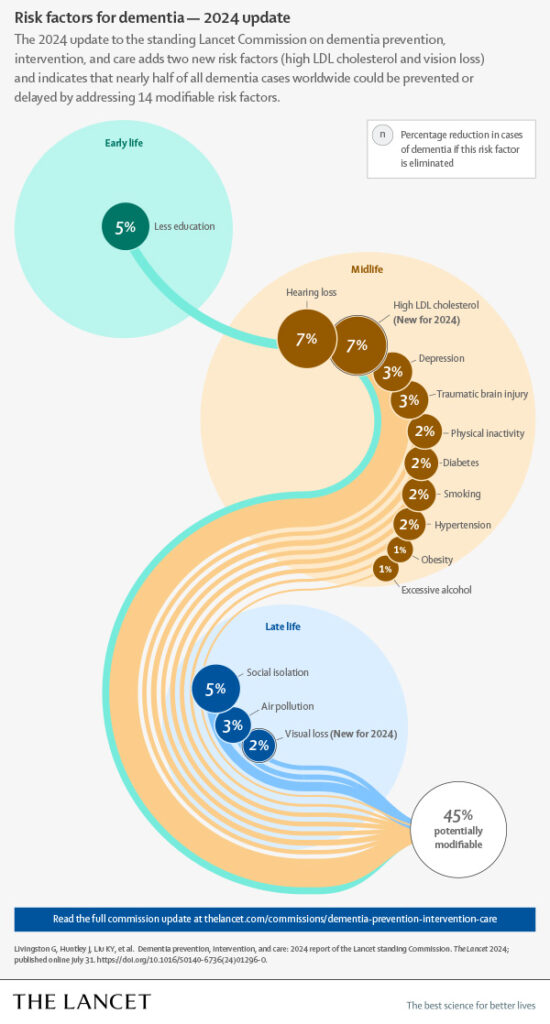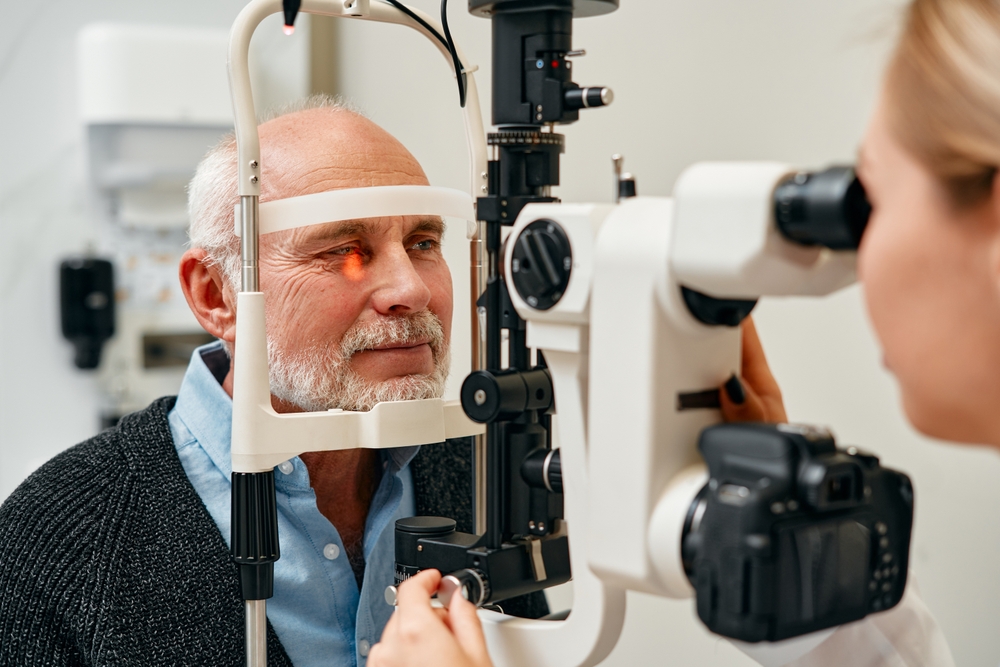As life expectancy increases worldwide, more people are living with dementia. Even though the age-specific rate of dementia is falling in some high-income countries, overall cases are still rising. This highlights the need for effective prevention strategies.
The Lancet Commission on dementia prevention, intervention, and care recently updated its findings. Their latest report emphasizes that targeting 14 risk factors can cut dementia cases by nearly half. The Commission added two new risk factors—vision loss and high levels of low-density lipoprotein (LDL) cholesterol—to their list, which previously included 12 risk factors.
The Commission, led by Gill Livingston, MD, of University College London in England, published its report on July 31, 2024 in The Lancet and presented simultaneously at the Alzheimer Association International Conference in Philadelphia.
The 14 Risk Factors Linked to Dementia
The modifiable risk factors linked to dementia are:
- Education
- Hearing loss
- Depression
- Head trauma (from sports or accidents)
- Physical activity
- Smoking
- Hypertension
- Obesity
- Type 2 diabetes
- Alcohol consumption
- Social isolation
- Air pollution
- Vision loss
- High LDL cholesterol
If all these factors were fully addressed, dementia rates worldwide could fall by 45%. This is why it’s essential to raise awareness and implement strategies that mitigate these risks.

High LDL and Vision Loss: New Dementia Risk Factors
One of the newly added risk factors, high LDL cholesterol, is one of the most significant contributors to dementia cases, accounting for around 7%. Untreated vision loss accounts for about 2% of cases.
Among the previously known risk factors, untreated hearing loss is key, accounting for 7% of the risk. Social isolation and a low level of education are tied for third, each responsible for about 5% of the risk.
The authors also reviewed other possible contributors to dementia, including diet, sleep problems, and mental health conditions. However, they concluded that more research is needed before declaring these as definitive risk factors.
How Lifestyle Interventions Can Help
This updated report reaffirms the good news that lifestyle changes can delay or prevent dementia. For example, physical activity, healthy diet, and cognitive engagement are proven methods to keep the brain sharp. In fact, trials involving exercise, hearing aids, and cognitive training have shown promising results. One study, known as the ACHIEVE trial, revealed that hearing aids reduced cognitive decline by 48% over three years in older adults at high risk of dementia.
Similarly, interventions like cognitively enhanced tai chi—which combines physical and mental exercises—led to significant improvements in cognition. This underscores that targeting risk factors can slash dementia cases, offering a powerful argument for policymakers to support preventive measures.
The Role of Policy in Dementia Prevention
“Currently, two-thirds of Americans have at least one major risk factor for dementia,” said Heather Snyder, PhD, of the Alzheimer’s Association in Chicago in an article in MedPage Today. “The need for effective risk reduction strategies to help all communities grows larger by the day. Without any change, the number of Americans with Alzheimer’s disease could more than double by mid-century.”
Policies that address these modifiable risk factors can significantly reduce dementia rates. However, implementing these policies requires long-term planning and commitment. In a separate report on a cost-benefit analysis of policies addressing dementia risk factors, the investigators wrote: “It is possible that policy makers are hesitant to put these interventions into place given the long lead time before the benefits of cognitive decline could be expected.”
That analysis estimated the impact of various health policies in England. The policies included raising alcohol prices, reducing dietary salt and sugar, and mandating helmet use for cyclists. One striking result was that reducing daily salt intake could prevent over 43,000 dementia cases in people aged 45+. This policy alone would save billions in healthcare costs.
The benefits of measures to prevent cognitive decline may take years to become evident. However, the immediate positive impact on general health, such as reduced rates of cardiovascular disease, makes these interventions worthwhile.
The Future of Dementia Prevention
The Lancet Commission’s research is part of a growing body of evidence showing that lifestyle changes and public health policies can slow the rise in dementia cases. Targeting the 14 risk factors listed can cut dementia cases by nearly half, making prevention a feasible goal if governments and health organizations take decisive action.
For now, individuals can take steps to protect their own brain health. Engaging in regular physical activity, managing cholesterol levels, using hearing aids when needed, and staying socially connected are all proven ways to reduce the risk of dementia. As new research continues to emerge, we can hope for more effective strategies to combat this growing public health challenge.
See a summary of the Parsemus Foundation’s Alzheimer’s Disease Prevention Project here. See our previous blog posts on the topic here.



